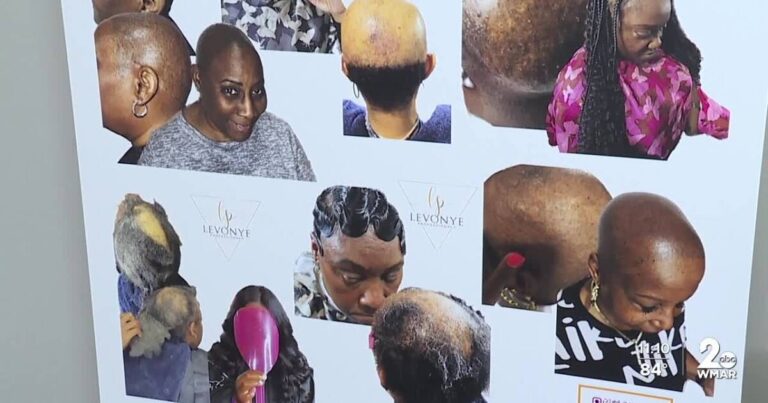GLEN BURNIE, Md. — Nearly half of Black women experience some form of hair loss, according to experts at Johns Hopkins Medicine.
But few doctors are knowledgeable about Black hairstyling methods, leaving many women to sift through unhelpful or even harmful advice on their own.
Yarmikia Edmonds started out as a licensed cosmetologist, but when her grandmother was diagnosed with breast cancer and began losing her hair, it prompted Edmonds to make a change.
“When that happened, I had to camouflage the areas where she was suffering from alopecia,” Edmonds says.
She quickly realized that many women needed similar treatment, so she became a certified hair loss therapist and founded her own company, Levonye Professionals, to help those suffering from alopecia and other hair loss conditions.
She said she was surprised by how many people needed help, but also by how she learned about the extent of the hair loss.
“She came in with absolutely no hair, and when she told me what had happened, I didn’t realize that something traumatic can happen to someone on their journey and cause them to lose all their hair in an instant,” Edmonds said.
Not only are some people affected by hair loss due to genetics or autoimmune diseases, but many also experience hair loss due to stress.
Edmonds said this was the most shocking thing he found out about.
“I never imagined alopecia would manifest in this way in the space I’m in right now,” Yarmikia Edmonds says.
Edmonds doesn’t just treat and cover hair loss.
She dedicates her time to supporting and counselling clients who have experienced trauma as a result of losing their hair.
She says it’s equally important that people look after their own mental health.
“The first thing I would recommend is to do some kind of therapeutic talk therapy with someone,” Edmonds says.
She also recommended looking more deeply at the scalp, and we did just that with a procedure called a hair test.
Edmonds says that monitoring your scalp is something that even women who aren’t experiencing hair loss can do.
“So if you can do a hair test and address it early, you don’t have to go through the process of actually losing your hair,” she says.
Edmonds says the most important lesson she always tries to impart to her clients is that life goes on after hair removal, and there are many ways to feel like yourself again.
“Alopecia is unpredictable, so don’t end it all.”
Edmonds specializes in alopecia, but because there are many different types of alopecia, he recommends that anyone suffering from it should first see a dermatologist to get a proper diagnosis.
Edmonds said some insurance companies will cover her treatment plan and she may be able to work out a payment plan.

